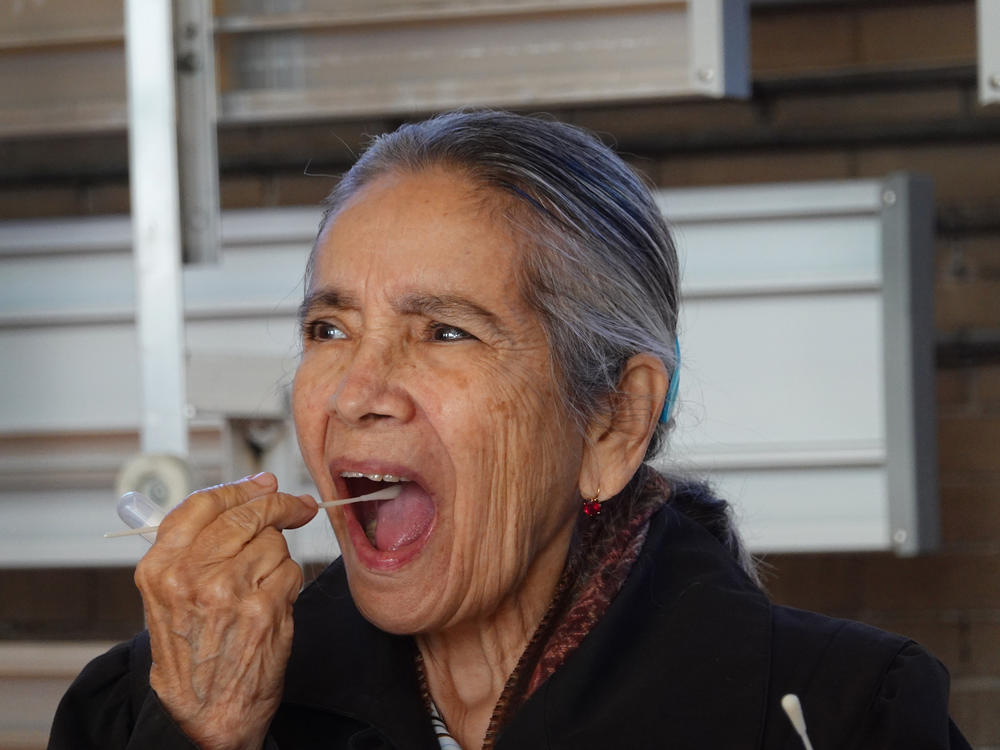Section Branding
Header Content
Is The Biden Administration Doing Enough To Boost COVID-19 Testing?
Primary Content
The Biden administration is promising to finally solve the nation's chronic shortage of COVID-19 tests. But is the new administration doing enough, especially with the more contagious coronavirus variants now looming?
Many public health experts are encouraged by the new administration's commitment to the importance of testing. But some are concerned officials are moving too slowly.
"Testing is actually more important now then it was eight months ago because of the high contagiousness rate of these new variants," says Mara Aspinall, a professor of health practice at Arizona State University. "It is critical to stop these new strains right in their tracks. And the only way to do that is to test."
Spotting infected people through widespread rapid testing is crucial for slowing the spread of the virus. And this strategy can buy time to get enough people vaccinated to head off another surge and help prevent new variants from emerging, Aspinall and others say.
"The concern about the variants really underscores the urgency with which we need to act to stop the spread of this virus," says Jennifer Nuzzo, a senior scholar at the Johns Hopkins Center for Health Security. "The more people who get it, the more opportunities for the virus to mutate and to potentially gain attributes that we don't want to see, like increased severity or reduced susceptibility to vaccine."
And that means the U.S. can't let up on tried-and-true public health strategies, she adds. "Testing and contact tracing, isolation and quarantine reduce the number of people who get infected and reduces the opportunity for the virus to mutate," Nuzzo says.
An administration official told NPR they know more testing is needed – they're doing what they can now.. But they've asked Congress for substantial new funding for testing as part of the COVID-19 relief package currently under negotiation, and they'll continue to look for ways to expand testing.
The administration recently announced plans to buy 8.5 million of the newly authorized, fully at-home rapid test. In addition, the administration last week announced plans to invest in six other companies to boost production of rapid at-home tests by 61 million tests by the end of the summer.
"Having 60 million more at-home tests over the course of the summer is exactly what the country needs. I think it will change things pretty significantly," said Andrew Slavitt, the White House Senior Advisor for the COVID Response Team, at a recent briefing.
But several public health experts told NPR that 61 million tests is far from what's needed, arguing instead the country needs to be doing tens of millions of tests every day.
"The 61 million by the end of the summer is simply not going to cut it," says Dr. Michael Mina, an infectious disease epidemiologist at the Harvard T.H. Chan School of Public Health. "The virus still has an impressive grip on us. We need to be scaling these [tests] up today."
Mina has advocated for the Food and Drug Administration to authorize more simple, rapid, inexpensive tests that could be produced in tens of millions every day, enabling people to repeatedly test themselves at home.
Flooding the market with at-home tests could make up for shortfalls in supplies and the sometimes long wait-times with traditional PCR testing. Testing rates are currently stagnated around the country. The U.S. currently conducts around 1.6 million a day.
"It just requires somebody, ideally now the Biden administration, to look at the landscape of what we have available and say, 'Yes — we are going to use this as a path forward and keep a third wave of infections from hitting America,'" Mina says.
Others agree.
"Given where we are right now and given the fact that we have these variants circulating right I think it's really important that we have these tests now," says Dr. Ashish Jha, the dean of the Brown School of Public Health. "We need these tests are quickly as it possible and get them out to people."
For example, Mina would like to see a test produced by Innova Medical Group in Pasadena, Calif. The company has been trying to get the FDA to authorize its test, which costs about $5.
"I don't really look at this from our business perspective because I'm selling every test that I can make around the world," Daniel Elliott, Innova's president and CEO, told NPR in an interview.
"What I look at it from is: People are dying. My kids can't go to school. When you can utilize a very simple, cost-effective, readily available test to break the chain of transmission and save lives it's very frustrating that our home team isn't using these," Elliott says.
Copyright 2021 NPR. To see more, visit https://www.npr.org.

